Book

Abstract
The French Challenge deals with France's effort to adapt to globalization and its consequences for France's economy, cultural identity, domestic politics, and foreign relations. The authors begin by analyzing the structural transformation of the French economy, driven first by liberalization within the European Union and more recently by globalization. By examining a wide variety of possible measures of globalization and liberalization, the authors conclude that the French economy's adaptation has been far reaching and largely successful, even if French leaders prefer to downplay the extent of these changes in response to political pressures and public opinion. They call this adaptation "globalization by stealth."
The authors also examine the relationship between trade, culture, and identity and explain why globalization has rendered the three inseparable. They show how globalization is contributing to the restructuring of the traditional French political spectrum and blurring the traditional differences between left and right. Finally, they explore France's effort to tame globalization—maîtriser la mondialisation—and the possible consequences and lessons of the French stance for the rest of the world.
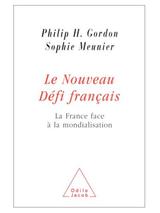
Abstract
S’adapter ou disparaître sous la domination américaine : la globalisation économique représente un défi pour toutes les sociétés. Il est toutefois particulièrement dramatique en France, du fait de notre tradition étatique, de notre souci de justice sociale, de notre attachement à notre langue, à notre culture, à notre identité, ainsi que de notre vieille rivalité avec les États-Unis.
Beaucoup de Français s’accordent à penser que la mondialisation comporte des bienfaits, mais ils sont nombreux à s’inquiéter de ses effets sur la répartition des revenus, l’emploi, la culture et la position de la France dans le monde. Qu’en est-il vraiment? La France ne s’adapte-t-elle pas plus nettement qu’on ne veut bien le dire ? Et l’idée de " mondialisation maîtrisée "? Peut-elle devenir réalité ou bien est-ce un mythe inventé par les hommes politiques afin de rassurer le public?
"Un travail impressionnant pour mettre au jour les racines historiques et intellectuelles de la résistance française à la globalisation et pour montrer comment la France réussit à s’adapter sans s’américaniser." Stanley Hoffmann.
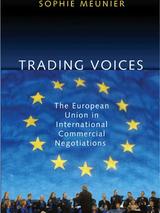
Abstract
The European Union, the world's foremost trader, is not an easy bargainer to deal with. Its twenty-five member states have relinquished most of their sovereignty in trade to the supranational level, and in international commercial negotiations, such as those conducted under the World Trade Organization, the EU speaks with a "single voice." This single voice has enabled the Brussels-based institution to impact the distributional outcomes of international trade negotiations and shape the global political economy.
Trading Voices is the most comprehensive book about the politics of trade policy in the EU and the role of the EU as a central actor in international commercial negotiations. Sophie Meunier explores how this pooling of trade policy-making and external representation affects the EU's bargaining power in international trade talks. Using institutionalist analysis, she argues that its complex institutional procedures and multiple masters have, more often than once, forced its trade partners to give in to an EU speaking with a single voice.
Through analysis of four transatlantic commercial negotiations over agriculture, public procurement, and civil aviation, Trading Voices explores the politics of international trade bargaining. It also addresses the salient political question of whether negotiating efficiency comes at the expense of democratic legitimacy. Finally, this book looks at how the EU, with its recent enlargement and proposed Constitution, might become an even more formidable rival to the United States in shaping globalization.
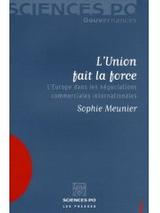

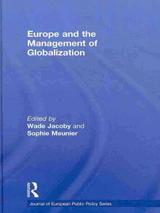

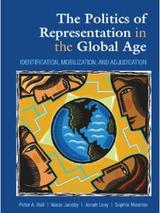

Abstract
Under what conditions does the internal cohesiveness of the European Union determine its external effectiveness on the world stage? This book asks this question, investigating the frequent political assumption that the more cohesive the EU presents itself to the world, the more effective it is in achieving its goals. Contributions to this book explore this theory from a range of perspectives, from trade to foreign policy, and highlight complex patterns between internal cohesiveness and external effectiveness. These are simplified into three possible configurations: internal cohesiveness has a positive impact on external effectiveness; internal cohesiveness has no impact on external effectiveness; and internal cohesiveness has a negative impact on external effectiveness. The international context in which the EU operates, which includes the bargaining configuration and the policy arena, functions as an intervening variable that helps us to explain variation in these causal links. The book also launches a research agenda aimed at explaining these patterns more systematically and determining the marginal impact of cohesiveness on effectiveness. This book was originally published as a special issue of the Journal of European Public Policy.
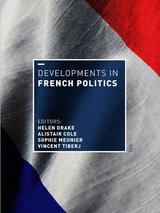
Book Chapter
Journal Article
Abstract
Was the European Court of Justice a key actor in the "relaunching" of European integration in the 1980s? This article examines the crucial political role that was played by the Court with its Cassis de Dijon judgment in the rejuvenation EC harmonization policy and the development of the Single European Act. The authors challenge the dominant view that the Court's legal decisions in themselves create policy consequences, or that legal verdicts reflect the views of dominant member states, so as to create focal points around which a policy consensus emerges. They argue, instead, that the Cassis verdict acted as a catalyst, provoking a political response by the Commission, which attempted to capitalize on the verdict to create a "new approach to harmonization." This political entrepreneurship by the Commission triggered the mobilization of interest groups that lobbied their national governments for and against mutual recognition. Generalizing from the case, this article concludes that the Court performs three crucial roles in the EC policy-making process: opening political access to self-interested individuals, launching ideas into the policy-making arena, and provoking political responses through bold argumentation and unpopular verdicts.
Abstract
Although the Member States of the European Union (EU) have long since relinquished their power to act as autonomous actors in international trade negotiations, they have now chosen to regain some of their lost trade sovereignty. Neither the European Court of Justice's (ECJ's) 1994 opinion, nor the 1997 reform of the trade policy process at Amsterdam delegated full negotiating authority to the Commission over the 'new trade issues' of services and intellectual property. Instead, Member States settled on a hybrid form of decision-making to enable ad hoc rather than structural delegation of competence. Was this a rollback of EU competence? If so, why has it occurred in the EU's oldest and most successfully integrated, policy sector? A shift in the perceived trade-off between economic interests and ideological bias on the part of key Member States can explain such a change. This article also explores the consequences for the future conduct of the EU's trade policy and its influence in shaping the world political economy, as well as for the evolving pattern of federal allocation of jurisdiction in the EU.
Abstract
This article studies the determinants of international bargaining power in instances of trade negotiations between the European Union and the United States. The authors’ central hypothesis is that an appraisal of the US–EU trade relationship requires an understanding of the ways in which “domestic” political institutions shape the bargaining behavior of international actors. In particular, this article argues that the frequent EU “successes” in its negotiations with the US are the result of the bargaining power that its unique institutional arrangements grant its negotiators. In order to explain the distributional outcomes of international trade negotiations, the authors explore the “Schelling conjecture” and analyze why it is particularly relevant to the understanding of the unique bargaining power of EU negotiators when they are confronted with their American counterparts. To examine the explanatory power of domestic institutions in episodes of trade negotiations, the article analyzes the US-EC Uruguay Round agricultural negotiations (1986–1993).
